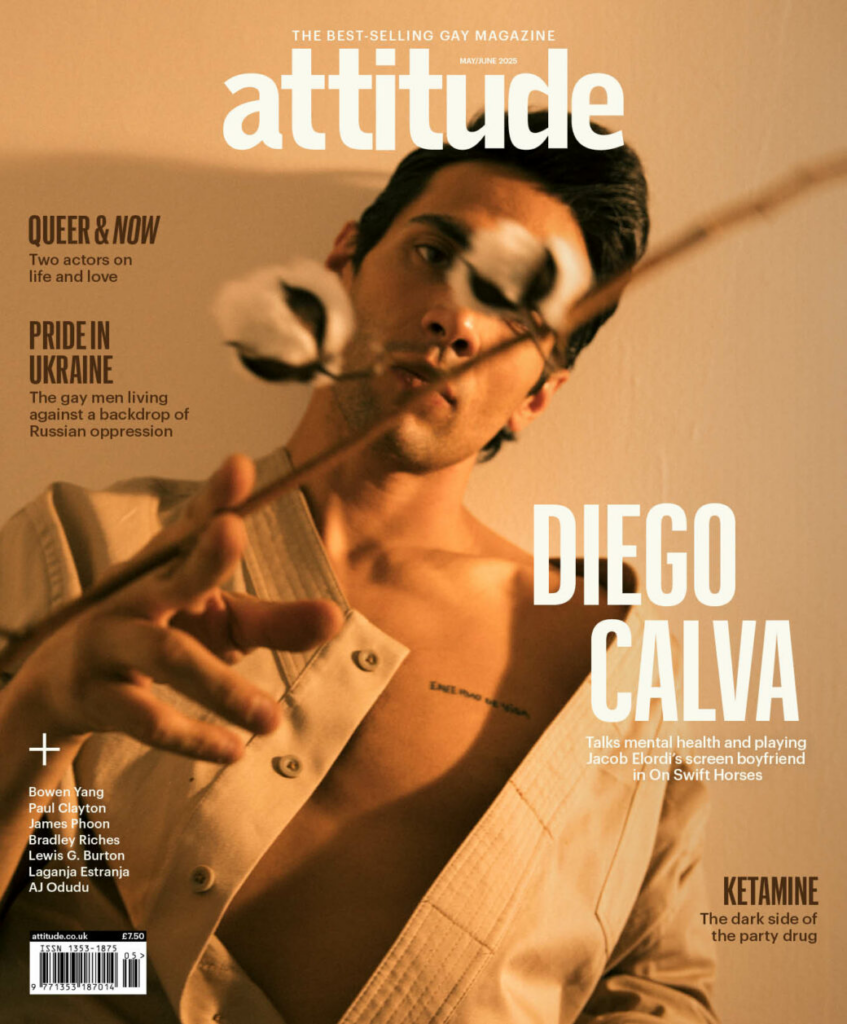Actors James Phoon and Paul Clayton on coming out, love, and generational differences (EXCLUSIVE)
This is the first in Attitude’s Queer & Now series, where we bring together LGBTQ+ people who work in the same field but have lived through different eras to connect, reflect and uncover the threads that link their lives
By Dale Fox
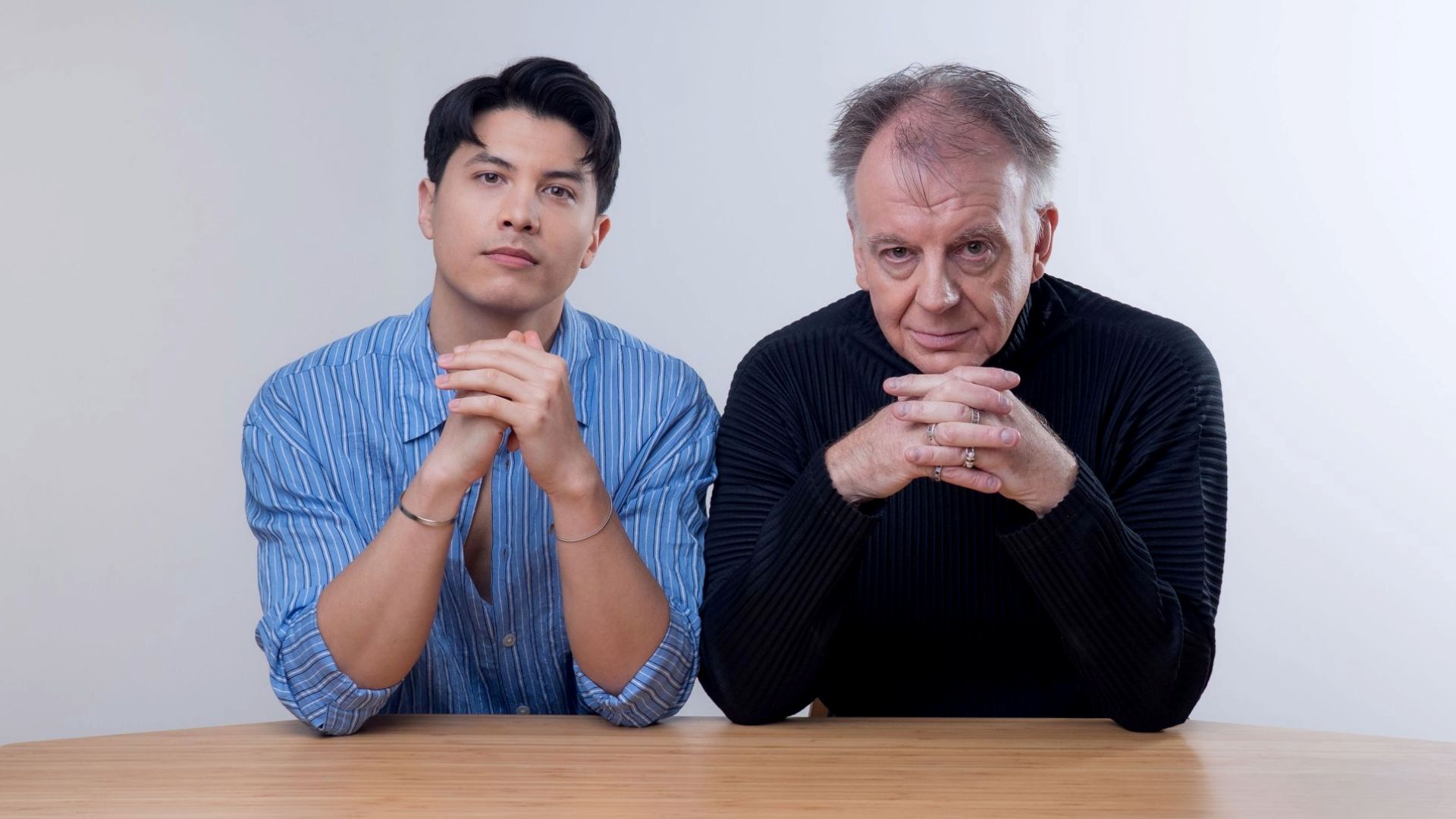
“They were told to cash in their pensions and spend their savings because they were going to die,” says actor Paul Clayton, 68, reflecting on the gay men who lived through the height of the AIDS crisis.
Opposite him, James Phoon, 30, listens carefully. “It’s something I think about a lot,” he says. “How a generation above me had such a completely different experience to what I’m having now… it’s so impossible to compute.”
It’s the first time these two actors have met, but their connection is instant. For a full hour, they sit across a table and just talk — unprompted and uninterrupted — about growing up, coming out, and carving out space in a world that hasn’t always made it easy. Their lives span different decades, but they speak a shared language — one shaped by fear, joy, resilience and the need to be seen.
Paul and James on…
Childhood
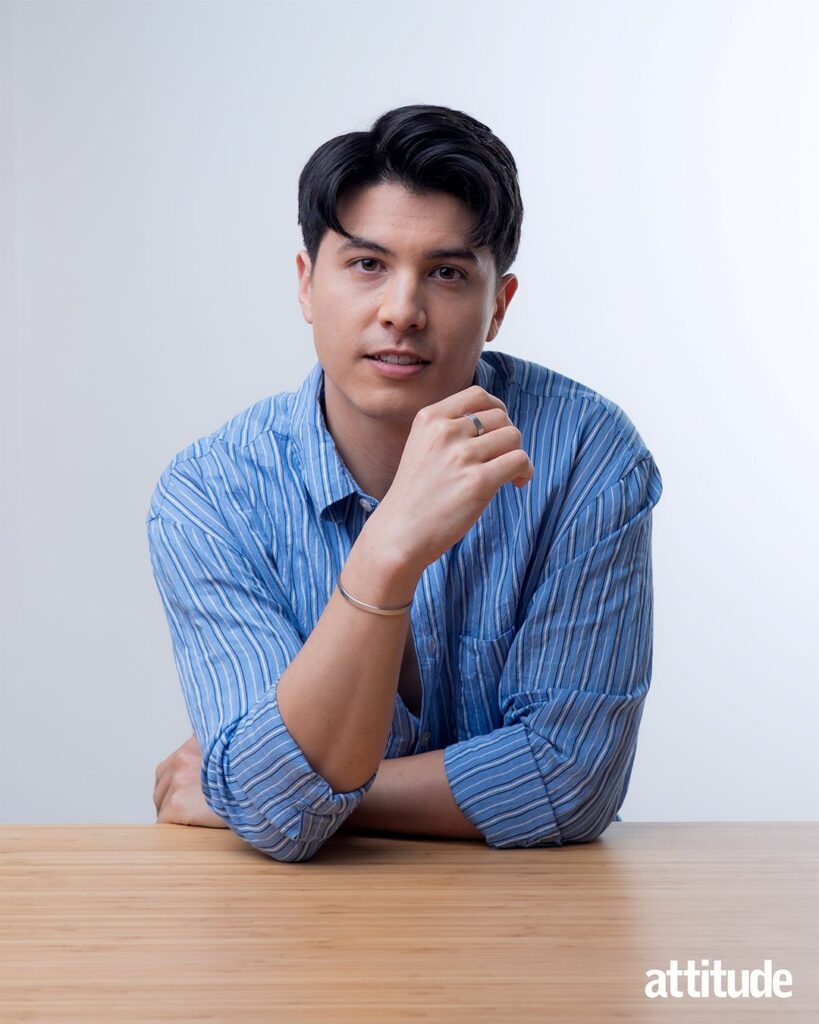
Phoon: I used to like playing by myself. I’m a bit of a recluse, actually. I’d play in my room or in the garden by myself. My older sisters and I used to argue a lot. We’d try and play board games, but it wouldn’t go well.
Clayton: I spent a lot of time upstairs wrapped in gold curtains and a hairbrush, being Shirley Bassey. I did plays in the garden and had to ask the girls who lived down the road if they’d be in my show.
Phoon: I used to really want to be a witch. I had this broom and I was obsessed with Hocus Pocus. I’d pretend to be Sarah Jessica Parker singing “Come little children, I’ll take thee away.”
Clayton: I’m more Bewitched, Elizabeth Montgomery. That’s the first generational gap!
Phoon: TV was definitely a part of how I realised I wanted to act. I’d pretend to be a superhero or secret agent. I knew I wanted to act but didn’t know how you did it. No one in my family was in the industry.
Coming out
Clayton: The coming out thing was really strange for me because it was really comfy. I don’t think I would ever have told my dad, and I don’t think he’d have wanted to know. Then I got to the RSC at Stratford, and within three weeks, I got a phone call that he was in hospital with stomach cancer, and he’d got a couple of months, and then he died. He didn’t get to see me there, which was a shame.
So, then I was looking after Mum. That was in the 1980s. I remember going home, and Mum sort of became a friend. Then it was ITV AIDS Week. “Don’t die of ignorance.” And it felt like, if you were telling someone you were gay, you were saying, “I’m going to die.” So, I couldn’t tell her. We carried on like that. She wasn’t asking girlfriend questions, and I think she knew, but we hadn’t had the conversation, until one night, after a charity ball I’d been working on.
My mother was chatting to Ian McKellen in her Hyacinth Bucket way, going “Oh, yes, Sir Ian; no, Sir Ian…” Then she turned to me and said, “Well, what do you want?” And I thought, ‘Oh, right — she’s trying to get in with Ian McKellen.’ So just to sort of defend myself, I said, “Listen — I’m gay too.” She turned and looked at me and said, “Oh, Paul, I wasn’t sliced yesterday!” Lisa Tarbuck was sat next to her, and I think Lisa Tarbuck actually weed herself at that.
Phoon: I think… it’s that phrase, “It gets better.” It’s such a cheesy phrase, but I think it’s exactly that. I was very racked with fear and turmoil before coming out, about what it meant, what people’s reactions would be, how I would live my life. I was very stressed about it. But I always knew. I came out when I was 13 or 14. I admire you were able to have that relationship with your mum, where you didn’t have to talk about it, whereas I was so aware that I was concealing something from everyone.
I just got to a point where I thought, ‘I have to come out right now.’ It was the middle of the night, on a school night. I went up to my mum’s room and knocked on her door and said, “Can we talk?” And I told her. Then the next day at school, I told some of my friends. Then I asked my mum to tell my dad. All at once, after that one night, I was like, ‘I have to do this now; I can’t keep it to myself anymore.’
Representation
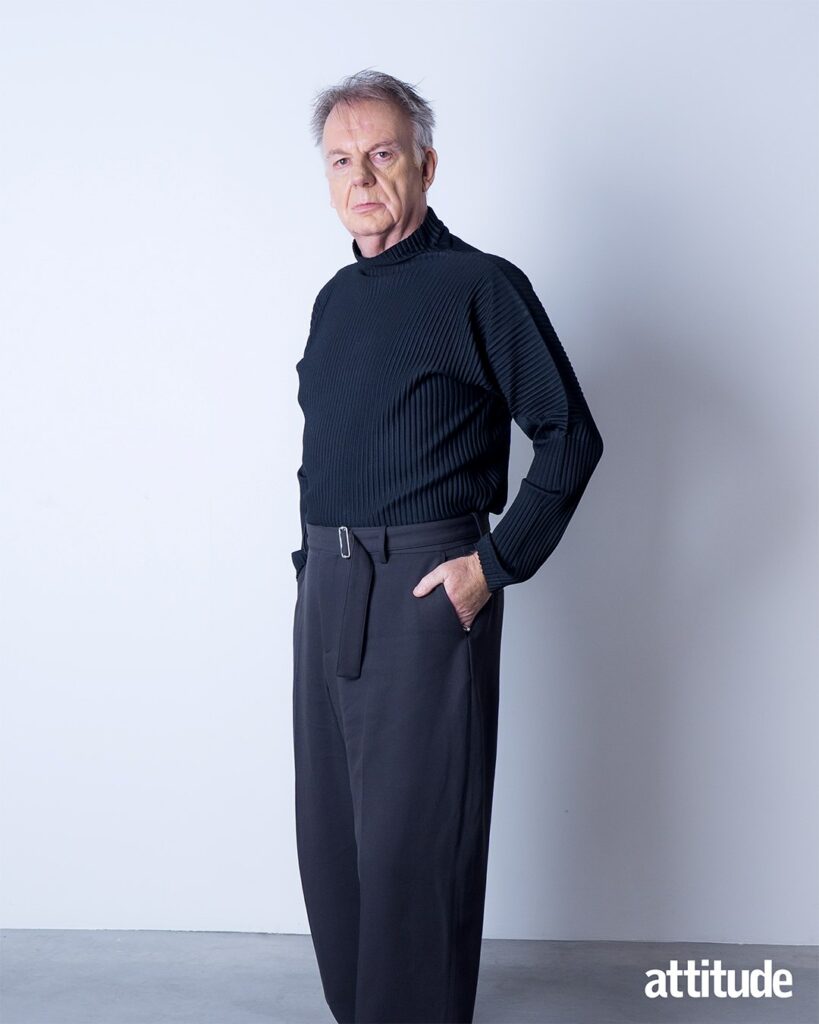
Clayton: I did a week in EastEnders at the end of last year, playing a drag queen called Drew Peacock. It was about men of my age, nearly 70, who were HIV-positive [in the 1980s] and had survived — people we forget about. They were told to cash in their pensions and spend their savings because they were going to die. So, they did that, and then they didn’t die, and now they’re late-60s, early-70s and not financially secure.
The response I got from it was amazing. People saying thank you and that it allowed them not only to acknowledge the friends they had who were in that position, but also to remember people who had gone through that and weren’t with us anymore in a really positive way.
Phoon: I remember growing up, watching EastEnders with my mum, there was Christian and Syed, who were a gay couple on the show. It was one of the very rare gay relationships on TV at the time. And that was the time before streaming as well, so everyone was watching it live.
Clayton: I had Dick Emery, who you probably wouldn’t have known. Dick Emery was famous for playing lots of parts, including women. Absolutely straight comedian, but his gay character [Clarence] had a handbag and would say “Hello, Honky Tonks.” And that was our role model, what we aspired to be.
The acting community
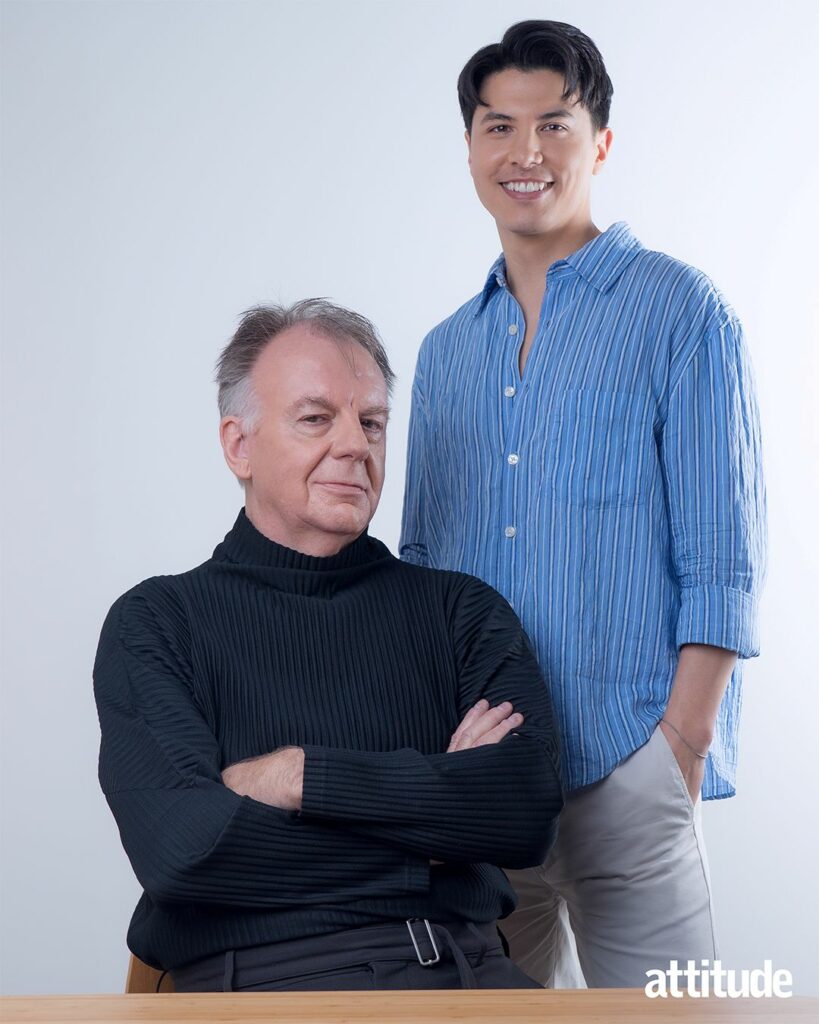
Phoon: You sort of expect the industry to be competitive. I really expected it to be like fighting for that one space at the table. But actually, especially with East Asian actors, there’s a real vibe of trying to lift each other up. We’ve got a group chat — we shout about each other’s work, we talk about auditions even if we’re going up for the same part. We give each other advice. I’ve found a surprising sense of community I didn’t think I was going to find as an actor.
Clayton: I think it’s probably a bit easier to talk now. I love my WhatsApp and everything, but we didn’t have that, so we were more isolated. We’d meet in the pub. But it took a lot of balls and them being very close friends to admit, “I haven’t had anything this week.”
Phoon: Isn’t that the best, though? When someone says, “Oh, yeah, it’s been really hard,” and you have that real conversation.
Clayton: No — they don’t say that! They say, “Oh, haven’t you? I did two workshops and a reading for a new ITV thriller.” And on social media, you get that front stage and backstage, where they’re going “#actorslife, busy day, casting”. And you think, ‘Fuck off!’
Queer roles
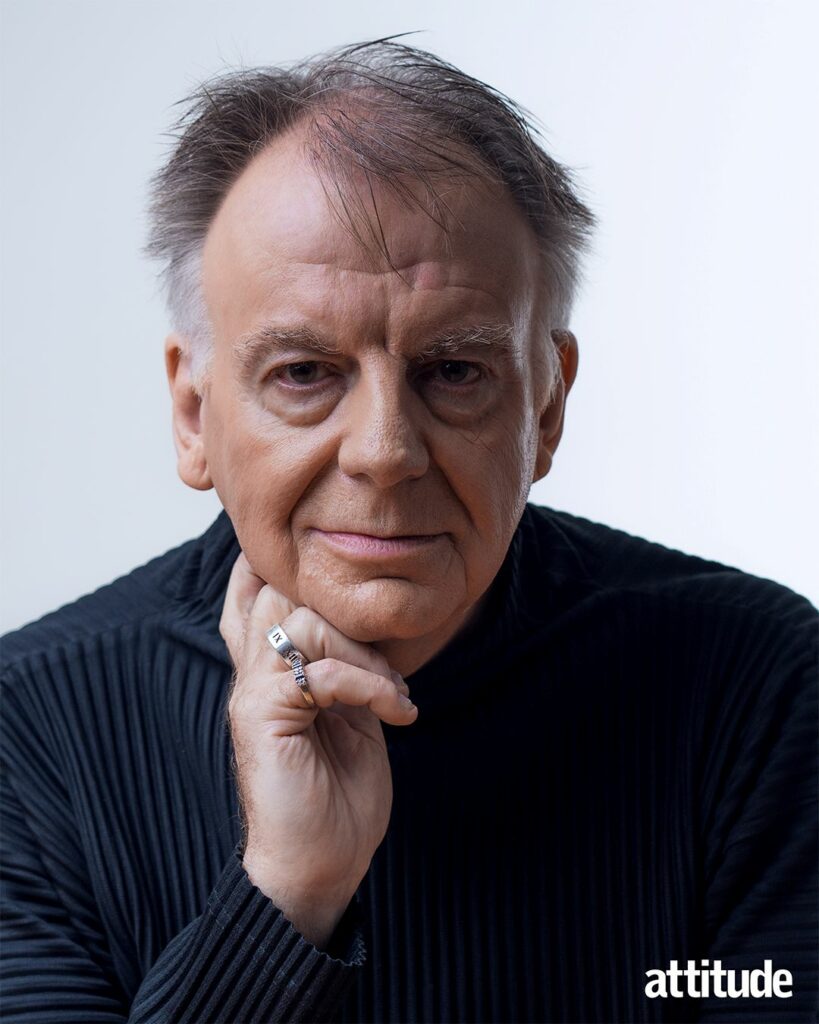
Phoon: In my head, there’s two different kinds of representation: the very focused stories that are about that specific experience, of being gay or whatever. And then there’s also the really important representation, where someone is allowed to exist within a story as a gay person, and that’s not the whole crux of it. And that’s an element of who this character is, but actually that’s not the story.
Clayton: The casting director on The Full Monty fought for [me to get the role]. And the brilliant thing about that [role] was that I was joining a character from the original film [as his partner], but now, it’s 25 years on. At no point does anyone say, “These people are gay.” This is just Lomper and Dennis, who are a couple and they run a café. It’s beautifully written, but at no point do we have to say, “This is a gay couple.” They’re just there, as part of mainstream fiction.
Career highlights
Phoon: When I got Bridgerton, it was surreal. I’d watched the first two seasons of this show with these characters on this set, and suddenly I’m in it, among it in 3D. I was seeing myself on the monitor and it felt like a fever dream. You must have had those moments in your career too?
Clayton: Walking onto the cobbles of Coronation Street, which I’d watched since I was nine. But I’ve had a few I wish I hadn’t taken. I try not to take things for the money but it’s hard at times, because we have mortgages to pay. I remember doing some BBC series. It was a couple of lines, but the director could not remember my name. He’d just go, “Erm, Magistrate, could you just lean to your right a little?” and you’re thinking, ‘Oh, fuck you!’
Peep Show
Clayton: I hadn’t seen Peep Show when I was asked to go and read for it. I hastily watched a bit of it on YouTube and thought, ‘Oh my God, they talk to camera the whole time.’ I went in for the audition not really caring — and ended up getting it.
It was the first time I’d had a child on television as well — Olivia Colman became my daughter. She’s divine. Absolutely divine. I’m very thrilled I did it, because like you doing Wreck, it gave you the keys to doing something else. I’ve been around a long time … and now a whole new generation of university campuses all over the country do Peep Show quizzes.
What’s funny is that people think I am my character. That I am a homophobic, Barbour-wearing, gun-shooting, right-wing Sussex person. Then they see me at a quiz night in Issey Miyake, with my partner and his mates, and they’re like, what?
Love and relationships
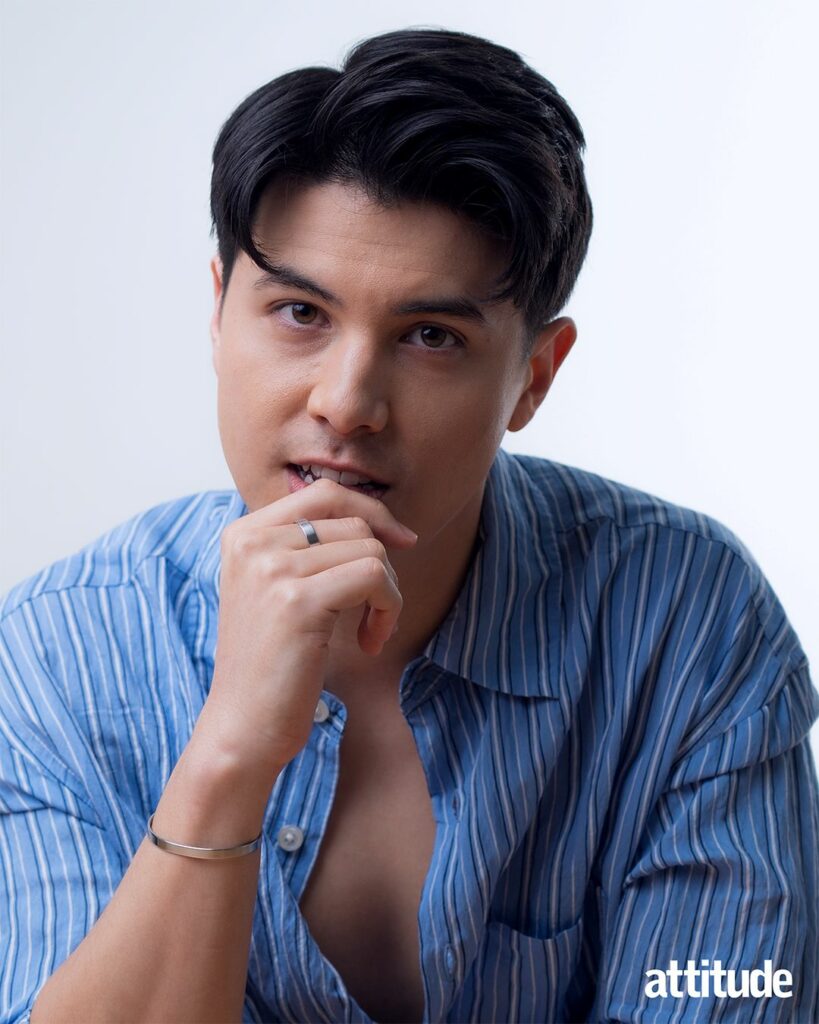
Clayton: My life changed in a big way, really, when I met somebody, somebody who has really taught me about what love is. I thought I’d been there — I hadn’t. If someone had told me that at this age I was going to be more in love and feeling more loved and cared for than I think I ever have been, and if you told me it was going to be a 28-year-old, six-foot-four Canadian that was doing it, but that’s my man.
Paul shows James a photo of himself and his partner.
Phoon: Oh, look at you. That’s so sweet. Where are you guys here?
Clayton: Oh, I have no idea. We’ve done loads of places, because things that you wanted to do suddenly seem possible. We drove round Iceland last year. We went to Japan for a month because he has passions that are not my passions, and I think that’s great. And similarly, he’d never been to the theatre. He didn’t know I was an actor. He’d never seen Peep Show. Then I watched him one night watch me on the telly… the way he watches just sort of makes it all worthwhile, really.
Phoon: Oh, I’m so happy for you. That’s so lovely. Every relationship is so different, and you learn something different from all the people in your life. There’s not one type of love or one type of perfect relationship.
Clayton: In fact, last week a campaign I’m doing with Terrence Higgins Trust went live. “Hey, I’m gay, I’ve been married, I’ve got a wonderful, lovely new younger partner. This is me. Gay Paul Clayton. But gay Paul Clayton has also started filming for an ITV thriller where I’m playing a foul-mouthed, right-wing Yorkshire business entrepreneur. But it means when I get home, I can be nice and gay and do all the homemaking that I love.
Phoon: We had this lovely party — me and my partner — we had a joint 30th and had all our friends there. It was just like a very, very special night.
Clayton: You have a partner at 30 — that’s what I dreamed about. I was still single, and [thought] ‘It’s never going to happen.’
The future and aspirations
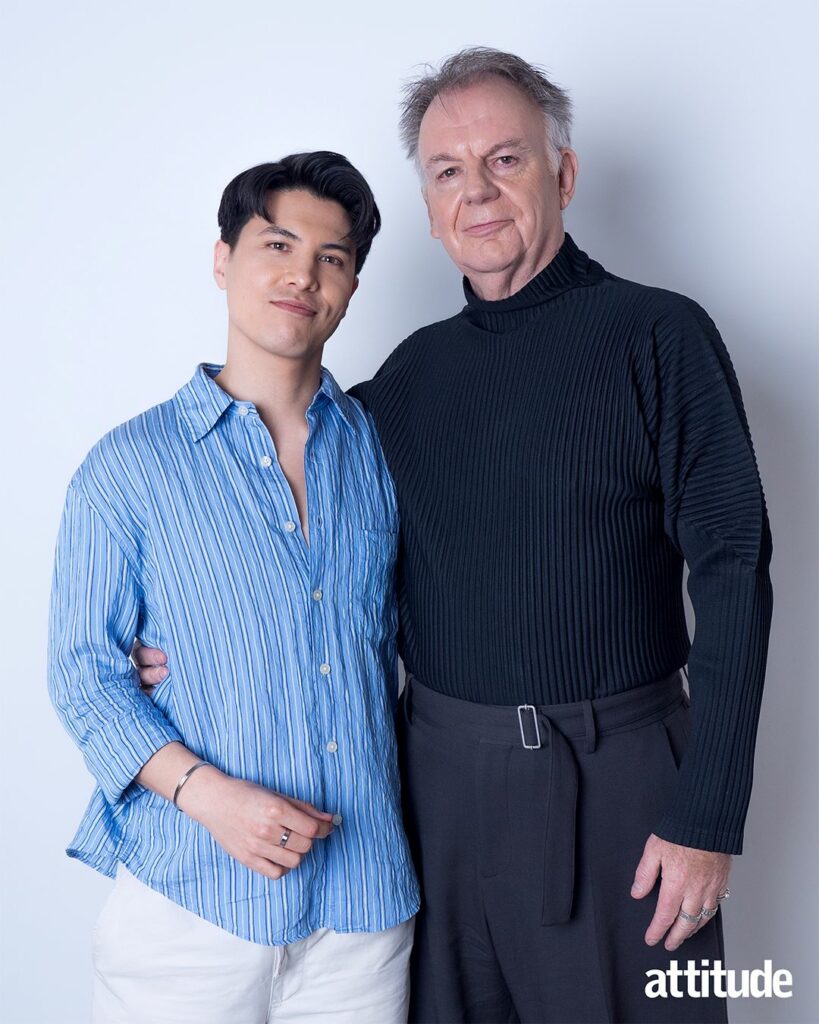
Clayton: One of the things I’m proudest of is that at nearly 70, I’m still working. I still turn up. I can still remember the lines. That’s the key.
Phoon: Do you want to keep acting forever, or would you ever want to stop?
Clayton: Until I fall asleep in the middle of a take! I’ve worked with actors who couldn’t remember lines and had them fed in on an earpiece and people are covering for them. I’d hate to do that; I’d hate to be a burden on another group of actors. But if I’m going to be something at 80, I want it to be turning up to act. I mean — Judi Dench. Eight minutes [of screentime in Shakespeare in Love]. Oscar.
Phoon: I can’t imagine stopping just for the sake of stopping. I don’t just do it because I want to be paid — I love the thing. The storytelling. The creation of it.
Clayton: I can see that when you’re doing it. In Wreck, the bit where you’re doing the TikTok, you think, ‘That boy’s having fun.’
Phoon: You have to have fun with it. One of things I have to remind myself is it’s not that serious. Sometimes you get caught up in, ‘This is a big scene — it has to be really good,’ but actually, it’s just acting.
Clayton: A healthy disrespect for everything you do.
This is an abridged version of a feature that appears in issue 364 of Attitude magazine, available to order here or alongside 15 years of back issues on the Attitude app.
